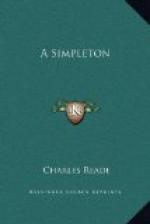“Highly grateful for the comparison!” cried Rosa. “Women and snakes!”
Dr. Staines blushed and looked uncomfortable. “I did not mean to be offensive; it certainly was a very clumsy comparison.”
“What does that matter?” said Mr. Lusignan, impatiently. “Be quiet, Rosa, and let Dr. Staines and me talk sense.”
“Oh, then I am nobody in the business!” said this wise young lady.
“You are everybody,” said Staines, soothingly. “But,” suggested he, obsequiously, “if you don’t mind, I would rather explain my views to your father—on this one subject.”
“And a pretty subject it is!”
Dr. Staines then invited Mr. Lusignan to his lodgings, and promised to explain the matter anatomically. “Meantime,” said he, “would you be good enough to put your hands to my waist, as I did to the patient’s.”
Mr. Lusignan complied; and the patient began to titter directly, to put them out of countenance.
“Please observe what takes place when I draw a full breath.
“Now apply the same test to the patient. Breathe your best, please, Miss Lusignan.”
The patient put on a face full of saucy mutiny.
“To oblige us both.”
“Oh, how tiresome!”
“I am aware it is rather laborious,” said Staines, a little dryly; “but to oblige your father!”
“Oh, anything to oblige papa,” said she, spitefully. “There! And I do hope it will be the last—la! no; I don’t hope that, neither.”
Dr. Staines politely ignored her little attempts to interrupt the argument. “You found, sir, that the muscles of my waist, and my intercostal ribs themselves, rose and fell with each inhalation and exhalation of air by the lungs.”
“I did; but my daughter’s waist was like dead wood, and so were her lower ribs.”
At this volunteer statement, Rosa colored to her temples. “Thanks, papa! Pack me off to London, and sell me for a big doll!”
“In other words,” said the lecturer, mild and pertinacious, “with us the lungs have room to blow, and the whole bony frame expands elastic with them, like the woodwork of a blacksmith’s bellows; but with this patient, and many of her sex, that noble and divinely framed bellows is crippled and confined by a powerful machine of human construction; so it works lamely and feebly: consequently too little air, and of course too little oxygen, passes through that spongy organ whose very life is air. Now mark the special result in this case: being otherwise healthy and vigorous, our patient’s system sends into the lungs more blood than that one crippled organ can deal with; a small quantity becomes extravasated at odd times; it accumulates, and would become dangerous; then Nature, strengthened by sleep, and by some hours’ relief from the diabolical engine, makes an effort and flings it off: that is why the hemorrhage comes in the morning, and why she is the better for it, feeling neither faint nor




